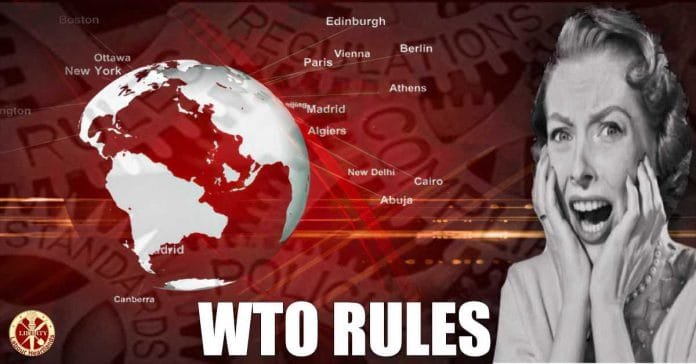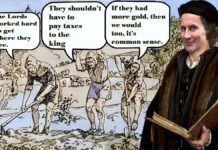Reality Check
Brexit, the ‘Cliff Edge’ and possible implications of a final ‘No-Deal’
The liberal-left commentariat and its beleaguered but ever vocal public supporters continue their stubborn push for a coveted second referendum or ‘People’s Vote’ on the final Brexit deal despite all of the legal complexities and obvious political crisis this would cause. This view is largely fed by a constant stream of hysterical and often apocalyptic warnings in The Guardian and The Independent that foresees airliners grounded, Dover lorry parks clogged and empty supermarket shelves. Nevertheless, it crystallises some very real fears held by many Labour supporters who have been let down by the narrow quality of media coverage of the process of leaving the EU and exactly what we might come to expect in both television news and the press.
The time has now come to assess what is still the (unlikely) impact of crashing out of the European Union without a final deal in place. While it’s more likely that a European Free Trade Association (EFTA) deal will eventually be agreed (even if it means the EU granting the UK an extended period to resolve the final package) any possibility of the UK ‘crashing out’ before a final deal is struck is likely to be proceeded by the dissolution of its agreement with the DUP very possibly followed by the downfall of an unstable government already clinging on to power by its fingers.
So, what if the much discussed ‘cliff edge’ is reached after the government fail to reach a final agreement on a EFTA deal, and are forced into a General Election where they go on to lose to an incoming Labour Government left with no option but to accept World Trade Order conditions. More precisely, what exactly can we expect going forward and what can we do about it?
Last week, the IMF forecast that the EU could lose as much as 1.5% of gross domestic product while the UK would suffer an even bigger hit – a 4% loss of national income by 2030 if we fall back on WTO Rules. With long established, complex trading links between EU countries some loss of trade would seem inevitable should the UK fail to agree to an EFTA trade arrangement (see the various ‘options’ below) as it would occupy the same trading position as any other non-European country.

At this juncture, it’s prudent to remind readers of the dire inaccuracy of the IMF, OBR and HM Treasury’s previous economic forecasts in relation to Brexit (HM Treasury: 23rd May 2016: ‘The Immediate Impact of Leaving the EU’). Its glaring inaccuracies are due mainly to its continued use of flawed supply-side forecasting models which fail to acknowledge the impact of factors such as aggregate demand and household debt on economic performance. Back then they confidently predicted a least worst-case scenario of a -3.6% drop in GDP and an estimated rise in unemployment of 520,000 which, in due course, simply failed to materialise.
In contrast, Cambridge Business School (Working Paper No. 483, January 2017: The Macroeconomic Impact of Brexit) which adopts a Keynesian macro-economic ‘evidence-based’ approach that takes into account long term trends in the behaviour of real economies and such factors as household demand and debt. They go on to argue that reversion to WTO Rules would have ‘little direct impact’ on interest rates, asset prices, and GDP which in the long term is expected to be well below Treasury estimates.
They conclude that ‘even if it ‘fell back to WTO rules…our expectation of any transitional losses to investment would be relatively small’. This view is borne out by two important long-term trends that serve as very useful indicators of future economic performance.
Firstly, that UK trade with the EU (the main chunk of its annual public deficit as the bloc’s biggest consumer) peaked in 1989 at 40% and has since reduced considerably in the long-term by over a quarter down to 30% up to 2015 to represent a shrinking proportion of overall UK trade. Secondly, interest rates on ‘ultra-long’ dated fifty year UK gilts and bonds fell to near record low interest rates of only 1.6% in the last few days. Contrary to some of the hysterical warnings about economic meltdown it provides a strong indication that holders of the national debt see the UK as a ‘safe bet’ and envisage no serious shocks to future economic performance. It’s also likely that levels of ‘peak’ private debt and slow growth in the UK and Europe has severely restricted profitable opportunities for returns on capital investment which attracts financial investors to gilts and bonds.
Either way, this situation allows an incoming Labour government huge room for fiscal spending and investment in a way which can certainly mitigate any unforeseen negative domestic economic effects through recourse to a comprehensive Keynesian reflationary program. While their long-term economic outlook predicts ‘slow growth in output… that has marked the UK and other Western economies since the banking crisis’ they emphasise this scenario to be ‘the case with or without Brexit’. Both trends are very encouraging and fly in the face of Project Fear’s warnings of impending economic apocalypse.
There is no doubt that even if the immediate impact might be temporary, cumulatively it may well provide a severe shock as the UK economy ‘corrects’ to its new international trading arrangements as the UK would be more dependent on a relatively seamless and comprehensive free trade deal than the other EU member states. Make no mistake, extra costs will be incurred as tariffs are very likely to be imposed on some UK goods, and extra investment and resources will be required for enhanced customs checks.
This is one area with the potential to disrupt the economy and cause a slow-down that could well effect ‘just in time’ storage of components and raw materials as well as impede their frictionless movement within international supply chains.
Non-EU countries typically face marginally higher tariff penalties on any exports into the Single Market. However these can be circumvented if the UK chooses to lift tariffs in some sectors for non-EU countries. This may well turn out to be a frenzied interim period as UK and EU negotiators will scramble at break-neck speed to strike agreements on a whole range of bi-lateral trade deals in the absence of more permanent WTO arrangements.
This would seem to be the most obvious way to alleviate the possibility of any unexpected shock or severe correction, which would restrict any potential loss of national GDP to a minimum and act as an ‘automatic stabilizer’ on the UK economy. One potential downside of Brexit is, thus, future arrangements for the transport of components and raw materials as this aspect will require careful consideration and would mean that the UK request an extension of Article 50 for a further 2-3 year period until such issues can be mutually resolved.
Much has been made of the potential difficulties that UK based financial services would encounter in gaining access to the European Single Market. Historically, financial services, most notably through the London capital markets, have always enjoyed a close working relationship with the governments of EU Member states that is of mutual benefit to one another, accounting for 37% of Europe’s financial assets. Each side has a strong economic interest in ensuring the smooth flow of trade so imposition of any tariffs is unlikely in the long term. Any reduction in access to the London capital markets would also have a massive knock-on effect on the economies of EU member states raise the cost of wholesale capital and interest rates on the Eurozone gilt and bond sales.
One area where a Labour government may make concessions to the EU is regarding the regulation of corporate governance and financial services. Cross border trade in services between the UK and EU could be allowed on the basis that Labour introduces tighter regulation on the operation of banking and finance as part of its wider policy of rebalancing the economy. This could include a separation of retail and investment banks, enhanced regulatory responsibilities and setting down targets to increase funding sources for SMEs in the regions. Each of these proposals are fully in line with current Labour Party policies on banking reform as well as the Basel III International Regulatory Framework due to be introduced in 2019.
Resolution of the Irish Border problem remains a major sticking point and the one issue most likely to bring about the downfall of the government should it be forced upon the Conservatives to impose a ‘hard border’ with customs ports on either side of the Irish Sea. It currently provides the only solution to preserve a common trade area and free flow of goods between the Republic and Northern Ireland. This solution which seems the most logical way to protect existing trade flows between the two respective national economies and would avoid a hard internal border but is seen as completely unacceptable to both the Conservatives and their DUP partners who both view this prospect as an existential threat to the future of the Union and the existing constitutional arrangement between Great Britain and Northern Ireland.
The inevitable adoption of an Irish Sea border may require a Labour government to pursue this strategy and risk the possibility of triggering a constitutional crisis by severing existing links between Great Britain and Northern Ireland on what would prove a highly controversial issue. Again, this would require a huge investment program to set up customs infrastructure at existing deep water cargo and passenger ports such as Holyhead, Stanraer and Milford Haven which as deep river wharves are ideally situated to this role.
These new ports could be supported by the construction of major new air freight hubs at locations like Carlisle and Bristol which are ideally suited to this role away from the main existing air-routes. The beauty of this system is that it dovetails with official Labour Party policy to construct HS3 from Glasgow and Edinburgh down the east and west spines of the mainland. This would have the impact of mitigating the worst effects of any new customs arrangements and sounds the most practical solution to the impasse. It would also have the effect of regenerating the western regions of England, Wales and Scotland providing much needed investment in employment and infrastructure in areas that are badly in need of regeneration.
The future of farming and agriculture after Brexit is arguably one of the most pressing and least certain in terms of outcome. The end of the Common Agricultural and Common Fisheries Policies are a case in point. There is little doubt ‘the CAP is also one of the European Union’s most economically inefficient policies, made worse by rent seeking, capture, and lobbying by landowners and producers’ (Helm, 2017: 124). It provides a golden opportunity to redesign a British agricultural policy along more environmentally sustainable lines that benefit local communities rather than the present system which benefits agribusiness interests. The opportunity to lift external EU tariffs and domestic production quotas is a double-edged sword. As with the lifting of the Common Fisheries Policy it would allow the development of economies of scale and more efficiently utilise spare economic capacity such as farmland, machinery, and labour.
Conversely, the lifting of any existing WTO tariff rates on imported produce could seriously undercut the profits of local small holders. Therefore any re-organisation would require placing a floor under the prices paid to farmers. It would need to strike a balance between improving agricultural earnings, allowing local communities greater control over environmental and resource management, and maintenance of food security by protecting home markets from cheaper imports, primarily through a combination of tariffs and subsidies. The practical problems arise from deciding whom to pay for these vital public goods and what sort of policy instrument would best serve desired objectives. While this presents difficulties it is not insurmountable in the long term would ultimately allow more environmentally sustainable agricultural and fisheries policies, end the problem of land capitalisation and allow the entry of new small holders into both industries.
There is no doubt that the UK falling back on a WTO deal will present many complexities and a period of economic insecurity or uncertainty that could well remain unresolved over the short-medium term for an incoming Labour Government. These will doubtless be resolved over the coming years and the economy rebalances itself away from financial services concentrated on London and the South East, aided by the new Basel III financial regulatory environment. This process should be balanced by support for manufacturing and exports located in the peripheral disadvantaged regions of England, Wales and Scotland wherever economic spare capacity exists in the form of labour, resources, farmland or fisheries that have chronically lacked investment for decades.
Any economic traumas will be mitigated by support and investment from Labour’s Regional Investment Banks. These new institutions outlined in the last manifesto will encourage the adoption of an interventionist industrial policy to bring about a recovery of manufacturing and exports. While conservatives and the left-liberal commentariat have become obsessed with the supposed damage Brexit may cause, very little critical attention now focuses on the social and economic damage caused by nearly a decade of austerity as well as further outsourcing and the sell-offs of British industrial assets that began in the Thatcher era. Brexit will not be detrimental to employment or output in the long run if an incoming Labour government takes responsibility and uses its fiscal capacity to focus on domestic growth and productivity.
However, the country will suffer if policies of fiscal austerity continue (with or without Brexit) and inevitable economic disruptions that will, in the short-run, accompany the process of disengagement will be exacerbated by on-going austerity policies.
Allen, K. ‘Low yield gilts show there is room for higher public spending’ The Financial Times (20/6/2018) https://www.ft.com/content/7f3a1bf2-73b2-11e8-aa31-31da4279a601
Helm, D. Agriculture after Brexit in, Oxford Review of Economic Policy, Vol 33: No,1( 2017) https://academic.oup.com/oxrep/article-pdf/33/suppl_1/S124/…/grx010.pdf
The Macroeconomic Impact of Brexit: Working Paper No. 483, January 2017 http://www.cbr.cam.ac.uk/fileadmin/user_upload/centre-for-business-research/downloads/working-papers/wp483revised.pdf
Labour’s Plans for Banking Reform (13th February 2018) https://www.policyforum.labour.org.uk/uploads/editor/files/Banking_Reform.pdf
HM Treasury: Immediate Economic Impact Report (May 2016) https://assets.publishing.service.gov.uk/government/uploads/system/uploads/attachment_data/file/524967/hm_treasury_analysis_the_immediate_economic_impact_of_leaving_the_eu_web.pdf
IMF Economic Outlook July 201 https://www.imf.org/en/Publications/WEO/Issues/2018/07/02/world-economic-outlook-update-july-2018
Help Us Sustain Ad-Free Journalism
Sorry, I Need To Put Out the Begging Bowl
Independent Journalism Needs You
Our unwavering dedication is to provide you with unbiased news, diverse perspectives, and insightful opinions. We're on a mission to ensure that those in positions of power are held accountable for their actions, but we can't do it alone. Labour Heartlands is primarily funded by me, Paul Knaggs, and by the generous contributions of readers like you. Your donations keep us going and help us uphold the principles of independent journalism. Join us in our quest for truth, transparency, and accountability – donate today and be a part of our mission!
Like everyone else, we're facing challenges, and we need your help to stay online and continue providing crucial journalism. Every contribution, no matter how small, goes a long way in helping us thrive. By becoming one of our donors, you become a vital part of our mission to uncover the truth and uphold the values of democracy.
While we maintain our independence from political affiliations, we stand united against corruption, injustice, and the erosion of free speech, truth and democracy. We believe in the power of accurate information in a democracy, and we consider facts non-negotiable.
Your support, no matter the amount, can make a significant impact. Together, we can make a difference and continue our journey toward a more informed and just society.
Thank you for supporting Labour Heartlands












